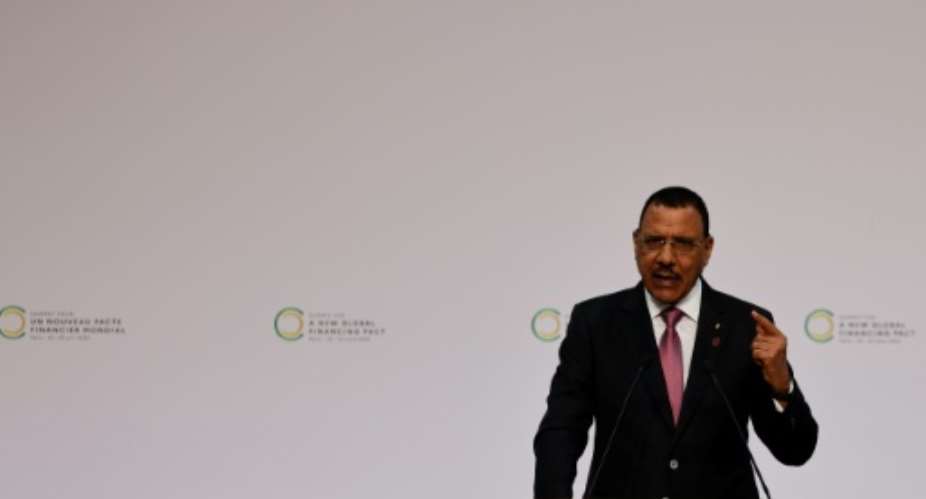Niger's ousted president Mohamed Bazoum, who was overthrown by military leaders on July 26, faces his 80th day in detention on Friday together with his wife and son.
Democratically elected to lead the West African nation, he remains adamant that he will not step down and has sought legal recourse in his plight.
Despite ongoing calls for his release by numerous countries and organisations, Niger's new military regime is unrelenting.
Detained for nearly three months
Since the coup, Bazoum has been held prisoner in his residence inside the presidential palace, with his wife Haziza and son Salem.
"His situation hasn't evolved," his Senegalese lawyer Mohamed Seydou Diagne said.
According to members of his entourage questioned by AFP, he is still "held captive without electricity" and with just intermittent access to water.
"He receives a supply of fresh food every two days and a visit regularly by his doctor," one of the sources said, adding that he is fine as is his wife and son.
"He is still as firm. He will not resign," another of his allies said.
In a column for the Washington Post at the beginning of August, Bazoum said he was being held hostage and described to Human Rights Watch the treatment of his family as "inhuman and cruel".
Legal recourse
On September 18, Bazoum filed a lawsuit with a court of the Economic Community of West African States (ECOWAS) to demand his release and the re-establishment of the constitutional order in Niger.
"When you file a request, the opposing party has one month to respond. At the end of this period, the court of justice of ECOWAS sets a date for a hearing," Diagne told AFP.
"There is a main request accompanied by an expedited request so that the court programmes a hearing within several weeks."
A lawyers' collective mandated by one of Bazoum's daughters announced plans at the start of the month to file a legal complaint against the military regime in Niamey. But it has not yet been lodged, one of the lawyers said.
International support
The United Nations and Western allies of Niger such as France and the United States were swift to condemn the coup and have shown their support for Bazoum, demanding his release.
A few days after his ousting, ECOWAS adopted the same position and threatened an armed intervention.
That option is still officially on the table but has not so far been launched.
France, an ally of Bazoum, began on October 9 to pull out its 1,400-strong military contingent which was in Niger as part of an anti-jihadist operation.
France's ambassador to Niger Sylvain Itte also left the country at the end of last month.
Both moves had been demanded by Niger's military leaders.
"There remains the question of Bazoum's release and the restoration of civilian rule in Niger," a French diplomatic source said.
"And so, there remains the need also for coordinated pressure with regional partners on the de facto authorities."
Meanwhile, the US Secretary of State Antony Blinken spoke by telephone on Monday with Bazoum to reaffirm support for his return to power.
The following day, Washington suspended its aid to Niger.
Bazoum is the country's fifth president to be deposed in a coup since Niger gained independence from France in 1960.
The first post-independence president, Hamani Diori who was overthrown in 1974, was imprisoned, then placed under house arrest for several years, before being freed in 1987. He left the country for Morocco.





 Azumah Nelson faces Irchad Razaaly in a match to empower youth
Azumah Nelson faces Irchad Razaaly in a match to empower youth
 Ejisu By-Election: I’m not a traitor, NDC people appreciate me – Independent can...
Ejisu By-Election: I’m not a traitor, NDC people appreciate me – Independent can...
 Some people expect us to be dogmatic, sycophantic supporters of Akufo-Addo even ...
Some people expect us to be dogmatic, sycophantic supporters of Akufo-Addo even ...
 NDC Campaign: James Agyenim Boateng is the right man to handle communications
NDC Campaign: James Agyenim Boateng is the right man to handle communications
 Mahama pledges to contribute to the development of Gonja Kindom
Mahama pledges to contribute to the development of Gonja Kindom
 “Ghanaman Time”: We've normalized the abnormal, accepted the unacceptable — Dots...
“Ghanaman Time”: We've normalized the abnormal, accepted the unacceptable — Dots...
 Bawumia begins nationwide campaign, starts in Eastern Region today
Bawumia begins nationwide campaign, starts in Eastern Region today
 Bawumia kicks off nationwide campaign with “bold solutions” for Ghana's future
Bawumia kicks off nationwide campaign with “bold solutions” for Ghana's future
 You cannot choose your successor; it’s only God who can – Mahama to Akufo-Addo
You cannot choose your successor; it’s only God who can – Mahama to Akufo-Addo
 Ejisu by-election: Vote for independent candidate Kwabena Owusu Aduomi to uphold...
Ejisu by-election: Vote for independent candidate Kwabena Owusu Aduomi to uphold...
